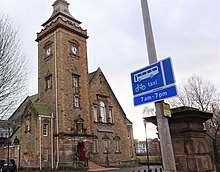Pollokshaws Burgh Hall
The Pollokshaws Burgh Hall is a municipal building at the edge of Pollok Country Park, Glasgow, Scotland. It is a Category A listed building.[1]
| Pollokshaws Burgh Hall | |
|---|---|
 Pollokshaws Burgh Hall | |
| Location | Glasgow |
| Coordinates | 55.8254°N 4.2984°W |
| Built | 1898 |
| Architect | Robert Rowand Anderson |
| Architectural style(s) | Renaissance style |
Listed Building – Category A | |
| Designated | 15 December 1970 |
| Reference no. | 33953 |
 Shown in Glasgow | |
History
The building was commissioned by Sir John Stirling Maxwell and designed by Robert Rowand Anderson in the Scottish Renaissance style.[2] It was built using features from the then recently-demolished Glasgow College in the High Street, and was completed in 1898.[1] It was used as the headquarters of the independent burgh of Pollokshaws until the burgh was annexed by Glasgow Corporation in 1912.[2]
After functioning community centre for Glasgow Corporation and then, from 1975, for Strathclyde Regional Council, it was deemed surplus to requirements in the late 1990s and the management of the building was transferred to the Pollokshaws Burgh Hall Trust in October 2000.[3][4]
The hall contains a concert-standard Wurlitzer which was rescued from Clydebank Town Hall in 2007.[2] The Scottish entertainer, Gordon Cree, appears to have developed a special and longstanding relationship with the Wurlitzer.[5][6]
Architecture
The dominant feature is the tower which is intended to replicate the tower on the old Glasgow College in the High Street.[1]
.jpg) Inside the clock tower
Inside the clock tower The entrance to the hall
The entrance to the hall The war memorial at the hall
The war memorial at the hall.jpg) one of five square carvings on the hall
one of five square carvings on the hall.jpg) Carving above the rear door
Carving above the rear door
References
- Historic Environment Scotland. "Pollokshaws Road and Bengal Street, Pollokshaws Burgh Hall (Category A) (LB33953)". Retrieved 19 April 2020.
- "Pollokshaws Burgh Hall". Days Open Days. Retrieved 19 April 2020.
- "About". Pollokshaws Burgh Hall. Retrieved 19 April 2020.
- "Pollokshaws Burgh Hall". The Glasgow Story. Retrieved 19 April 2020.
- "Nigel Ogden: The Organist Entertains". BBC. Retrieved 8 April 2012.
- Russell, Ian (17 April 2009). "Darvel entertainer Gordon Cree to appear as guest at Scottish Cinema Organ Trust". Kilmarnock Standard. Kilmarnock, Scotland: Scottish & Universal Newspapers Limited.
External links
